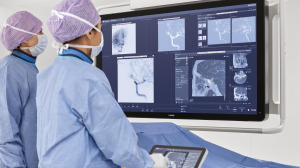by
John R. Fischer, Senior Reporter | June 23, 2023

Direct-to-angio suites with CBCT can save thousands of dollars in stroke care. (Photo of Philips Image Guided Therapy System Azurion, courtesy of Philips)
A study conducted at the Vall d’Hebron University Hospital Stroke Unit in Barcelona, Spain, showed that having a direct-to-angio suite, equipped with cone-beam CT (CBCT) can save more than $3000 per patient.
The researchers saw positive clinical outcomes with CBCT, which captures multiple scans from different angles to create 3D images of the brain, and have now recorded an economic analysis of their findings.
In the single-center ANGIOCAT clinical study, the clinicians bypassed scanning patients via MR or CT in the radiology department upon admission, instead bringing them straight to a dedicated angio-suite, equipped with a Philips Image Guided Therapy System, Azurion, which has built-in CBCT.



Ad Statistics
Times Displayed: 174461
Times Visited: 3181 For those who need to move fast and expand clinical capabilities -- and would love new equipment -- the uCT 550 Advance offers a new fully configured 80-slice CT in up to 2 weeks with routine maintenance and parts and Software Upgrades for Life™ included.
Here are two ways a direct-to-angio suite can improve stroke care:
Reduces time constraints
By being able to scan and prep patients immediately in the cath lab, providers saved more than 30 minutes of time, reducing risks for temporary and permanent side effects, as well as death.
Distinguishes different types of strokes
With its higher resolution, CBCT can distinguish intracranial hemorrhages from large vessel occlusions, enabling providers to immediately perform mechanical thrombectomies on patients with LVOs.
“We are reducing the risks of bleeding and other risks associated with the femoral branch,” Dr. Manuel Requena, neurologist at Vall d’Hebron University Hospital Stroke Unit, told HCB News.
Requena says this is the first single university clinical study, and is being followed up by a multicenter, international trial led by University Hospital Vall d’Hebron that involves Philips and healthcare providers in the U.S., South America, Europe, and Turkey. The trial is called WE-TRUST (Workflow Optimization to Reduce Time to Endovascular Reperfusion for Ultra-fast Stroke Treatment).
The economic analysis was published in the
Journal of NeuroInterventional Surgery (JNIS).

